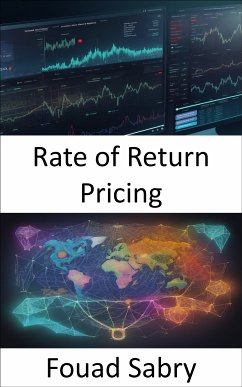What is Rate of Return Pricing
The rate of return pricing, also known as target-return pricing, is a way by which a company will determine the price of its product by taking into consideration the returns that they would want to receive on that product. The idea of rate return pricing is quite comparable to that of return on investment; but, in this scenario, the corporation has the ability to manipulate its prices in order to accomplish the objective that it has set for itself. With the exception of situations in which an investor asks a particular rate of return on their investment, this strategy is utilized most frequently by businesses that either own a substantial amount of capital or hold a monopoly on the market. There is a possibility that rate of return pricing is an ineffective market strategy in a competitive market because it places an emphasis on the end profit margins and does not take into account the dynamics of supply and demand. It is possible that if a rival is able to establish a lower price, it would diminish demand for the product, which will lead to sales that are lower than what was anticipated and will prevent the company from reaching the required profit margin.
How you will benefit
(I) Insights, and validations about the following topics:
Chapter 1: Rate of return pricing
Chapter 2: Monopoly
Chapter 3: Mergers and acquisitions
Chapter 4: Investment
Chapter 5: Profit maximization
Chapter 6: Marketing management
Chapter 7: Cost-plus pricing
Chapter 8: Hedge (finance)
Chapter 9: Market penetration
Chapter 10: Stock valuation
Chapter 11: Rate of profit
Chapter 12: Pricing strategies
Chapter 13: Venture capital financing
Chapter 14: Valuation using multiples
Chapter 15: Product line extension
Chapter 16: Revenue management
Chapter 17: Rational expectations
Chapter 18: Icarus paradox
Chapter 19: Utility ratemaking
Chapter 20: Monopoly price
Chapter 21: Product strategy
(II) Answering the public top questions about rate of return pricing.
(III) Real world examples for the usage of rate of return pricing in many fields.
Who this book is for
Professionals, undergraduate and graduate students, enthusiasts, hobbyists, and those who want to go beyond basic knowledge or information for any kind of Rate of Return Pricing.
The rate of return pricing, also known as target-return pricing, is a way by which a company will determine the price of its product by taking into consideration the returns that they would want to receive on that product. The idea of rate return pricing is quite comparable to that of return on investment; but, in this scenario, the corporation has the ability to manipulate its prices in order to accomplish the objective that it has set for itself. With the exception of situations in which an investor asks a particular rate of return on their investment, this strategy is utilized most frequently by businesses that either own a substantial amount of capital or hold a monopoly on the market. There is a possibility that rate of return pricing is an ineffective market strategy in a competitive market because it places an emphasis on the end profit margins and does not take into account the dynamics of supply and demand. It is possible that if a rival is able to establish a lower price, it would diminish demand for the product, which will lead to sales that are lower than what was anticipated and will prevent the company from reaching the required profit margin.
How you will benefit
(I) Insights, and validations about the following topics:
Chapter 1: Rate of return pricing
Chapter 2: Monopoly
Chapter 3: Mergers and acquisitions
Chapter 4: Investment
Chapter 5: Profit maximization
Chapter 6: Marketing management
Chapter 7: Cost-plus pricing
Chapter 8: Hedge (finance)
Chapter 9: Market penetration
Chapter 10: Stock valuation
Chapter 11: Rate of profit
Chapter 12: Pricing strategies
Chapter 13: Venture capital financing
Chapter 14: Valuation using multiples
Chapter 15: Product line extension
Chapter 16: Revenue management
Chapter 17: Rational expectations
Chapter 18: Icarus paradox
Chapter 19: Utility ratemaking
Chapter 20: Monopoly price
Chapter 21: Product strategy
(II) Answering the public top questions about rate of return pricing.
(III) Real world examples for the usage of rate of return pricing in many fields.
Who this book is for
Professionals, undergraduate and graduate students, enthusiasts, hobbyists, and those who want to go beyond basic knowledge or information for any kind of Rate of Return Pricing.
Dieser Download kann aus rechtlichen Gründen nur mit Rechnungsadresse in A, B, BG, CY, CZ, D, DK, EW, E, FIN, F, GR, H, IRL, I, LT, L, LR, M, NL, PL, P, R, S, SLO, SK ausgeliefert werden.









